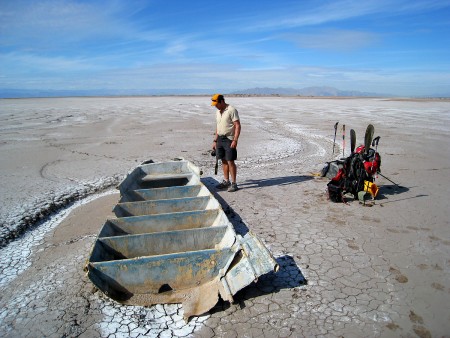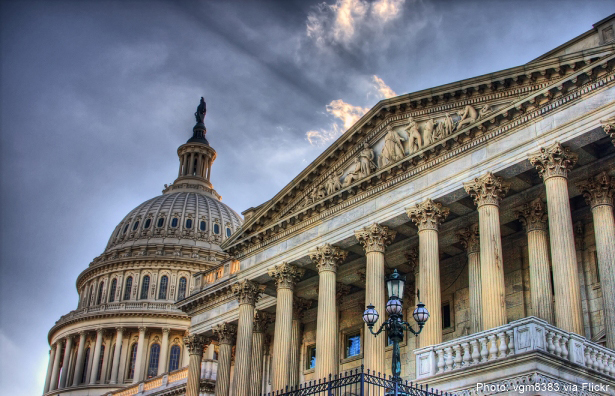The blame game began even before Senate Majority Leader Harry Reid (Nev.) made the official announcement that he would not bring a comprehensive climate and energy bill to the Senate floor. Reid himself placed the blame where it primarily belongs — obstructionism by the Republican Leadership, as a result of which not a single Republican senator had stood up to commit to work with Democrats to pass carbon pollution limits (Lindsey Graham (R-S.C.) did commit to work with John Kerry (D-Mass.), and Joe Lieberman (I-Conn.) but backed out after months of negotiations; Susan Collins (R-Maine) cosponsored a bill with Maria Cantwell (D-Wash.) but did nothing to work with her Senate colleagues to craft a bill that could actually pass; Olympia Snowe (R-Maine) expressed openness to a limit on power plant carbon pollution but never committed to a specific proposal; every Senate Republican voted to overturn EPA’s science-based finding that carbon pollution endangers public health and the environment).
Advocates for effective climate legislation are all angry and frustrated, and many have not been so targeted in apportioning blame. I will add my thoughts on lessons learned later in this post, but first let’s review the bidding: Some environmentalists blamed the White House for not doing enough; one White House official anonymously blamed environmentalists for not delivering any Republican votes; some liberals blamed Kerry and Lieberman for negotiating with oil companies and developing a proposal that didn’t excite the environmental base; some moderates blamed the basic idea of carbon pollution limits or blamed Kerry and Lieberman for overreaching and taking too long to scale back their proposal to focus just on power plants.
There may be grains of truth in each of these perspectives, but the bottom line is simpler and has nothing to do with the particulars of legislative proposals or the campaigns waged by proponents or the opposition: The Republican leadership has concluded that “no” is working for them regardless of public opinion about any individual policy, let alone the public interest.
Something else has been lost in the rush to point fingers — recognition of the broad support that was assembled for climate legislation and how far it got in this Congress. A majority of the public consistently supports comprehensive energy and climate legislation despite the opponents’ relentless misinformation campaign; many unions and thousands of businesses also recognized the need for legislation to drive job-creating clean energy investments and came out in support; a majority of the House voted for the ACES bill last year; a majority of the Senate affirmed EPA’s finding that carbon pollution endangers public health and the environment by voting to defeat the Murkowski Resolution; and a majority of the Senate was prepared to vote for a firm limit on carbon pollution. Nothing in the Constitution says that a supermajority is required to enact legislation, but the 60 vote barrier is the one obstacle that could not be overcome so far.
None of this means that advocates for climate legislation didn’t make any mistakes. Would different strategies or tactics have led to a different outcome? I honestly don’t know, but here are some lessons learned from the perspective of someone who spent the last few years trying to push a real bill through the real Congress. I make no claim to objectivity, but I hope this perspective adds some light to the heated discussion of what went wrong.
Lesson 1: Be careful in translating campaign positions into budget documents
The Obama administration got off to a rough start on climate policy when it put a revenue assumption from a carbon cap into its first budget based on Obama’s campaign platform. Opponents immediately attacked this as a tax that would transfer wealth from the industrial Midwest to the coasts. Many potential supporters were wary because the administration had not done the necessary political groundwork to reassure them that regional differences in carbon intensity and the competitiveness of energy intensive industries would be addressed (a footnote to this effect in the budget was not sufficient). Regional differences among Democrats may have prevented them from including climate legislation in the Congressional budget resolution in any case, but this misstep made it impossible, closing off the budget reconciliation pathway which could have allowed climate legislation to pass the Senate with a simple majority (this procedure proved crucial to enacting healthcare reform).
Lesson 2: Political capital is not necessarily a renewable resource
Perhaps the most fateful decision the Obama administration made early on was to move healthcare reform before energy and climate legislation. I’m sure this seemed like a good idea at the time. Healthcare reform was popular, was seen as an issue that the public cared about on a personal level, and was expected to unite Democrats from all regions. White House officials and Congressional leaders reassured environmentalists with their theory that success breeds success. A quick victory on healthcare reform would renew Obama’s political capital, some of which had to be spent early on to push the economic stimulus bill through Congress with no Republican help. Healthcare reform was eventually enacted, but only after an exhausting battle that eroded public support, drained political capital, and created the Tea Party movement. Public support for healthcare reform is slowly rebounding as some of the early benefits kick in and people realize that the forecasted Armageddon is not happening. But this is occurring too slowly to rebuild Obama’s political capital in time to help push climate legislation across the finish line.
Lesson 3: Winning the recess is as important as winning the vote
Henry Waxman (D-Calif.) surprised almost everyone when he met his self-imposed deadlines for steering the American Clean Energy and Security act (ACES) through the House of Representatives last June. The environmental community mobilized to help secure the last few votes needed to eke out a 219-212 victory. Unfortunately, while we celebrated that victory the opposition mobilized a vicious counter attack. By the time we organized a response the Tea Party movement had branded the very moderate Waxman-Markey bill as a radical government takeover of the energy industry alongside the supposedly radical takeover of the healthcare system that Waxman also steered through the House. The unified Clean Energy Works campaign was organized to prevent that from happening again in the Senate, but we were starting from a hole that we never fully dug out of.
Lesson 4: Never underestimate the allure of denial
Last November, thousands of emails stolen from the University of East Anglia Climate Research Unit were posted online. A handful of these emails, out of context, were widely disseminated by the Merchants of Doubt. Aft
er the 2007 report of the Intergovernmental Panel on Climate Change won the Nobel Prize, I had assumed that the debate about climate science was effectively over and, along with the rest of the environmental community, turned my attention to advancing solutions. A handful of emails couldn’t possibly undermine confidence in a body of peer reviewed scientific literature built up over two decades, could it? Rather than blow over quickly, however, the mainstream media went along for the ride in what came to be called Climategate. A new Project on Climate Science was launched to get the facts about climate change out to the media, five independent investigations have completely cleared the scientists who were attacked, and the National Academy of Sciences reaffirmed that there is overwhelming evidence that atmospheric pollution is causing global climate change. But all of this has come too late to alter the perception that public concern about climate change was diminished by the so-called scandal.
Lesson 5: Too much patience is as bad as too little
The environmental community was patient when President Obama decided to push healthcare reform before energy and climate legislation; we were patient when the administration turned to financial reform next; and we were patient while Kerry and Lieberman’s negotiations with Graham dragged on. By the time we lost our patience in July the Senate calendar was seriously stacked against us along with the unwavering opposition of the Republican leadership. It’s not clear whether it would have been possible to force action any quicker given how long it ended up taking to actually deliver the healthcare and financial reform bills to the president’s desk, but we could have done more to demand action prior to the December 2009 Copenhagen climate summit.
Lesson 6: Getting interest groups on board is not sufficient
The USCAP Blueprint for Legislative Action, released in January 2009, provided a consensus set of recommendations for how to craft carbon pollution limits from a diverse set of companies and non-governmental organizations, including NRDC. The idea was to accelerate the legislative process by surfacing and trying to resolve disputes about many of the policy details that would inevitably arise in writing and moving a bill through Congress. This strategy worked in the House, where the Blueprint served as the basis for much of the ACES bill. But the Blueprint did not address every issue and USCAP does not include all important interests. Kerry and Lieberman spent months negotiating with utilities, oil companies, and other businesses over legislative details left unresolved in the Blueprint. These negotiations were largely successful in broadening industry support for the proposal, in some cases at the expense of environmental interests, but in many cases by tweaking provisions in ways that only mattered to the companies who would be directly affected. The problem is that broader support by business trade associations did not translate into broader support by U.S. senators. The hardcore business opposition was unmoved and neither was the political and ideological opposition of the Republican leadership. These special interests were all too happy to cynically attack the bill for including special interest concessions. In the meantime there was never an effective process to engage enough senators themselves to resolve the issues essential to garnering 60 votes.
Lesson 7: Never, never, never give up — Winston Churchill
As the New York Times put it, “The danger of global warming is not going away just because Washington’s politicians don’t want to deal with it.” We will continue fighting to make the most of every opportunity to curb carbon pollution, whether that is through national legislation, Department of Energy efficiency standards, EPA pollution standards, or state and local action. We can afford to do no less.




